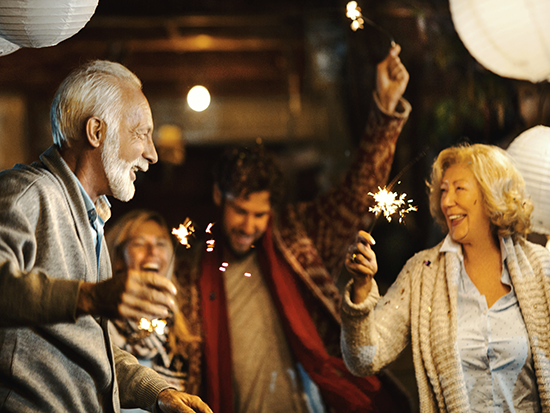 Watching the portion and carb content of food and drinks can help prevent blood sugar spikes this New Year’s Eve. New Year’s Eve serves as a culmination of three months’ worth of holiday celebrations and gatherings. For many, it is a time full of family, friends, and delicious food and drink. For those affected by diabetes, the season can be a challenge as they try to balance holiday spreads and their blood sugar.
Watching the portion and carb content of food and drinks can help prevent blood sugar spikes this New Year’s Eve. New Year’s Eve serves as a culmination of three months’ worth of holiday celebrations and gatherings. For many, it is a time full of family, friends, and delicious food and drink. For those affected by diabetes, the season can be a challenge as they try to balance holiday spreads and their blood sugar.
Ahead of New Year’s Eve, diabetes experts at the University of Alabama at Birmingham offer tips on how to safely ring in 2023.
“New Year’s Eve should be a time of celebration,” said Alexandra Dodd, M.D., assistant professor in the UAB Marnix E. Heersink School of Medicine Division of Endocrinology, Diabetes and Metabolism. “Following a few tips can help people with diabetes have a healthy holiday.”
Facing the holiday spread
In general, Dodd encourages those with diabetes to choose foods that have less carbohydrates and a lower glycemic index, which reduces the frequency of blood sugar spikes.
“Good options include vegetables and lean protein like poultry, fish and eggs,” Dodd said. “If you are eating grains, choose options like wheat bread or brown rice, which will cause less dramatic spikes in blood sugar since they are digested more slowly.”
Desserts are often part of holiday celebrations. While one cookie will not wreck one’s diabetes management plan, Dodd advises watching portion sizes of sweet treats. Additionally, patients who take insulin should take it before eating to ensure it covers food intake.
 Popping a cork
Popping a cork
When it comes to beverages, portion size and carb content is also key. If one prefers sodas, Dodd advises choosing diet or sugar-free options. If choosing an alcoholic beverage, a simple cocktail with the spirit and minimal additives can cause fewer blood sugar spikes. For beer, ask about low-carb options.
Mocktails are also a trending option for those who would rather avoid alcohol altogether. Make mocktails fun by finding a new, low-sugar recipe or trying out a “mocktail bomb,” which is a mix ball that can be added to sparkling water.
“Whatever route is best for you, a good rule of thumb is to avoid excess. For alcohol in particular, the effects of excessive drinking can be extreme for those taking insulin since alcohol can deplete glycogen stores in the liver and increase the risk of low blood sugar,” Dodd said.
Take precautions
The UAB Comprehensive Diabetes Center is a University-Wide Interdisciplinary Research Center composed of over 200 faculty members from 10 different schools and many departments.
Dodd recommends that those with diabetes bring along their glucose meter to holiday gatherings or wear their continuous glucose monitor to help them identify and treat low blood sugar before it becomes dangerous. Especially for those who have struggled with low blood sugar in the past, having a glucose monitor or meter nearby or in use during celebrations is key.
In addition to food and drink tips, people with diabetes should also follow all other common New Year’s Eve safety practices.
“If consuming alcohol, arrange a designated driver or other means of transportation. If walking around at night, bring a friend and stay in well-lit areas,” Dodd said. “And remember, don’t let your diabetes prevent you from doing the things you love on New Year’s Eve and every other holiday.”